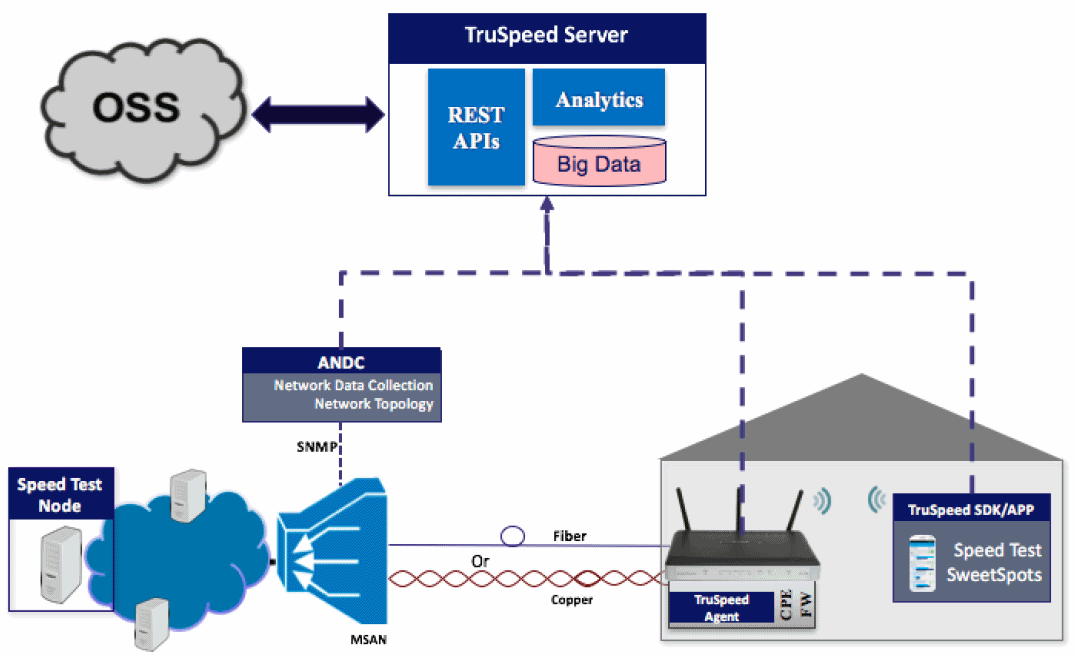ASSIA Create New Way for ISPs to Test Broadband and Wi-Fi Speed
California-based ASSIA claims to have developed a new and more accurate way to help ISPs measure their broadband speed, which uses cloud-based machine learning to “intelligently monitor and measure” both broadband and WiFi performance while assessing bottlenecks across five key points in the network.
At present the most common form of conducting a broadband speedtest, which involves consumers using a website based tool to check their connection performance, isn’t always reliable due to the many different factors that can impact performance (slow WiFi, local network load at time of the test, slow testing servers or a bad network / device setup etc.).
Meanwhile the Ofcom UK and SamKnows approach of installing a dedicated device (usually a modified second router) in the home in order to conduct more accurate testing is useful but difficult to deploy at any real scale because of the high costs involved (otherwise the sample size is too small or selective), which also rule it out as an option for smaller providers.
Advertisement
Instead ASSIA has developed a new testing system based on their CloudCheck® Wi-Fi and Expresse® patented technologies (software modules), which is called TruSpeed; not to be confused with TrueSpeed the ISP. The code (agent) for this would be installed on the ISPs own router via firmware (hardware agnostic).

Throughput Measurements Performed by TruSpeed Include:
1. In-home Wi-Fi throughput measurements initiated by the TruSpeed mobile app.
2. Wi-Fi throughput measured from the CPE [router] by the TruSpeed software agent, which provides accurate, real-time throughput to all devices connected to the CPE without any additional software required
3. End-to-end throughput measurements initiated by the TruSpeed app to a speed test node
4. Broadband throughput measured by the TruSpeed agent to a speed test Node
5. Access Sync/Contracted rate: Broadband sync rate passively collected on access nodes with optional Access Network Data Collector (ANDC)
The use of a mobile app to help measure Wi-Fi throughput, as part of the overall approach, is something we’d have to test since in our experience mobile devices tend to deliver worse wireless performance than a wireless equipped laptop or desktop computer (perhaps partly due to the limitations of space for a good antenna).
Nevertheless this could prove interesting for UK ISPs, particularly given on-going changes in market regulation (Ofcom’s 2018 Broadband Speed Code) and the new advertising rules that require providers to display “average” speeds (a median measured at peak time) for their packages (here).
Advertisement
ASSIA Statement
Delivering advertised broadband service speeds by ISPs has become critical in today’s regulatory environment. Global telecommunications regulators are adopting stringent rules to ensure advertised/minimum broadband speeds are delivered. Financial consequences for operators are significant including the ability of consumers to exit contracts when commitments are not fulfilled.
The governmental and market need for accurate throughput measurement has become essential to ISPs, wholesalers and communications regulators alike. TruSpeed enables ISPs to measure the speed of broadband and Wi-Fi networks, providing historical and real-time network-wide visibility and verification of compliance as well as granular and specific detail of subscriber speeds to the end-user’s Wi-Fi devices.
This visibility can also be provided to the subscriber, increasing confidence in his or her network bandwidth. With TruSpeed software, ISPs can meet compliance requirements and reduce OPEX and churn costs, all while dramatically increasing customer satisfaction.
Other software-based and dedicated hardware-based approaches in the market today cannot accurately measure Wi-Fi throughput, or must rely on limited crowd sourced data samples of the population. The TruSpeed software solution provides full actual throughput visibility of critical segments of the network and uses ASSIA’s unique agent technology, which discriminates between the different network stakeholders’ responsibility in delivering end-to-end Quality of Service (QoE). TruSpeed can isolate bottlenecks across any access and subscriber Wi-Fi network.
The TruSpeed agent is already supported by more than 100 platforms and can be deployed on an entire network, allowing fully-automated testing. ASSIA solutions are currently deployed on over 100 million connections around the world.
At present it’s unclear how much all of this would cost to implement, although it’s bound to be cheaper than the SamKnows approach but would still be complicated for most of the smaller providers to deliver. Similarly any providers involved would also need to have some control over the firmware of any routers they ship to customers and many smaller ISPs don’t bundle a free router.
Apparently more details should appear on this page later today: http://www.assia-inc.com/products/cloudcheck/truspeed .
Mark is a professional technology writer, IT consultant and computer engineer from Dorset (England), he also founded ISPreview in 1999 and enjoys analysing the latest telecoms and broadband developments. Find me on X (Twitter), Mastodon, Facebook, BlueSky, Threads.net and Linkedin.
« EU Boost Fibre and Admit Failing its 2020 Ultrafast Broadband Target UPDATE
VPNFilter Malware Targeting More Consumer Broadband Routers »
















































Comments are closed